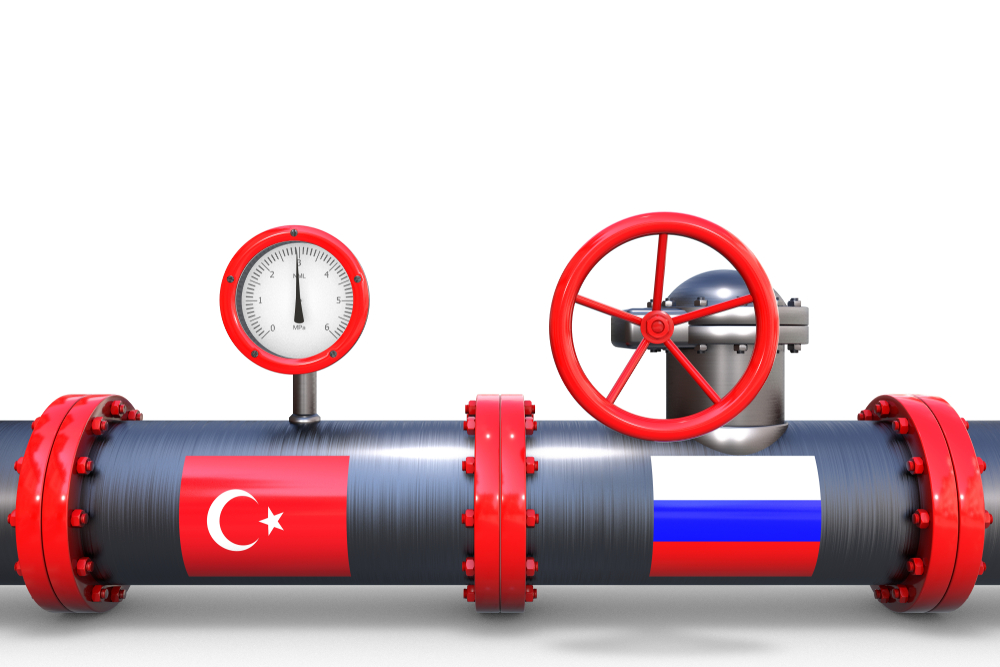Cooperation between Turkey and Russia in the field of has been increasing lately. Rosatom, the Russian nuclear energy company, will build a new Turkish nuclear reactor, and it is reported that Turkey has increased its imports of Russian oil, including Ural and Siberian Light Crude, by over 200,000 barrels a day since the start of 2022. Turkey appears to be counting on Russia to supply its energy and oil derivatives imports, on a lenient payment program. Russian President Putin agreed, following a meeting with Turkish President Erdogan in Sochi, that Turkey could pay for some of these energy imports in Rubles.
An important indicator of this growing cooperation between the two countries is the willingness of Russian companies to invest in Turkish nuclear energy plants. Moreover, in January 2020, the liquid gas pipeline, carrying gas from Russia to both Turkey and Europe via the Black Sea, became operational. In turn, Turkey has refused to enforce Western sanctions on the Russian energy sector, and has kept its doors open to Russian companies, allowing Russian citizens and businessmen to invest their money in Turkey’s financial and banking sector. Russia has meanwhile refused to implement the sanctions imposed on Turkey by the EU as a result of its drilling operations in the eastern Mediterranean.
The rise in Russian oil exports to Turkey has been driven by the fallout from the war in Ukraine, as Western sanctions on Russian exports drive it to find willing buyers, and Turkey’s need for oil and gas imports drive it to take advantage of Russian offers. Russia offers its oil at a 20% discount from market prices. Turkey’s two main refineries, that belong to the Azerbaijani company of Sokar, have significantly increased their imports of Russian oil, reducing their imports from the North Sea, Iraq, and west Africa. This has led the US Treasury department to warn last August that Russian companies and individuals are trying to use Turkey to bypass western sanctions. It is worth noting that the Turkish Energy Minister remarked last March that Turkey intends to continue purchasing Russian oil, and that it depends on Russia for 45% of its gas, 17% of its oil and 40% of its benzene. Moreover, in view of Turkey’s falling foreign currency reserves, which fell to less than 59 billion dollars last July, Russia’s willingness to receive payment for part of its exports to Turkey in Rubles is an important advantage.
Nuclear energy is another area which has seen increased cooperation between Turkey and Russia, as Turkey seeks to invest in nuclear energy plants to supply part of its needs. In 2018, President Putin and and President Erdogan laid the foundations for the construction of the Akkuyu nuclear plant in the Mersin region on the Mediterranean coast. This was at a cost of about $20 billion including Russian funding. The Rosatom nuclear group is building the Akkuyu nuclear power plant, and transferred 5 billion dollars last July to complete construction , in a move that aims to dispel any concerns about delays to the project due to the sanctions imposed on Russia.
In sum, Turkish-Russian cooperation in the energy sector fulfills important needs for both countries. It enables Turkey to meet its energy requirements on advantageous financial terms and allows Russia a reliable market for its exports should the sanctions related to the war in Ukraine continue for an extended period. Trade and investments in the energy sector also allow Russia to build regional and international alliances to shore up its position vis-à-vis Western pressures.


